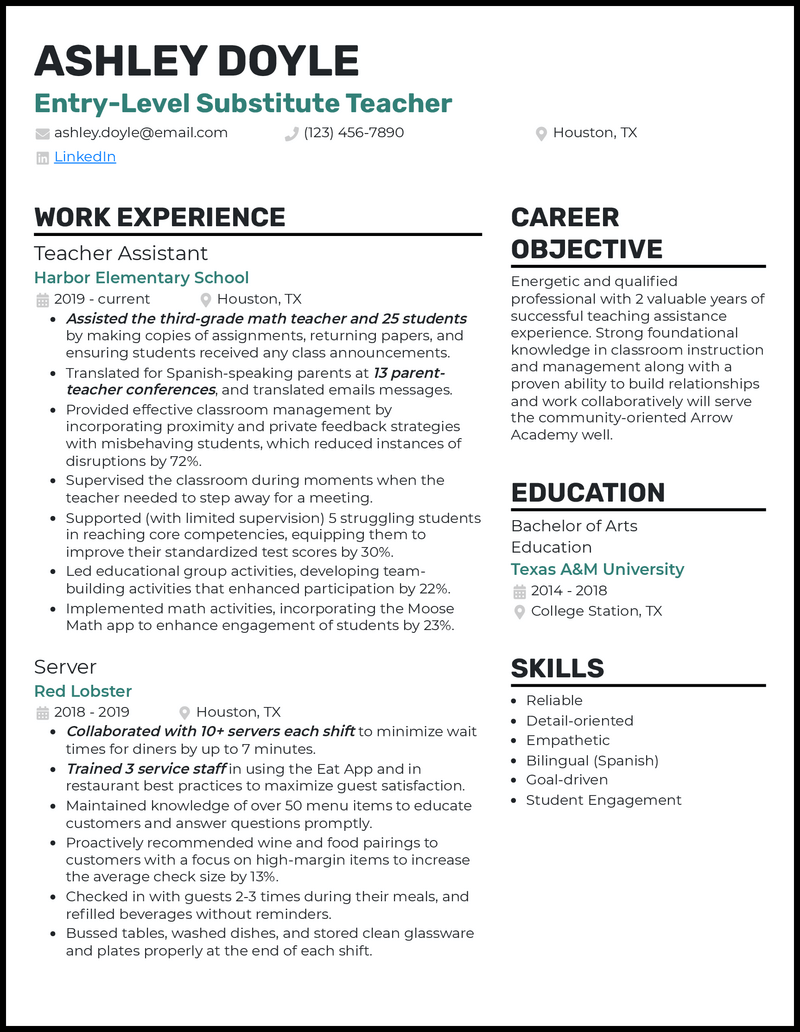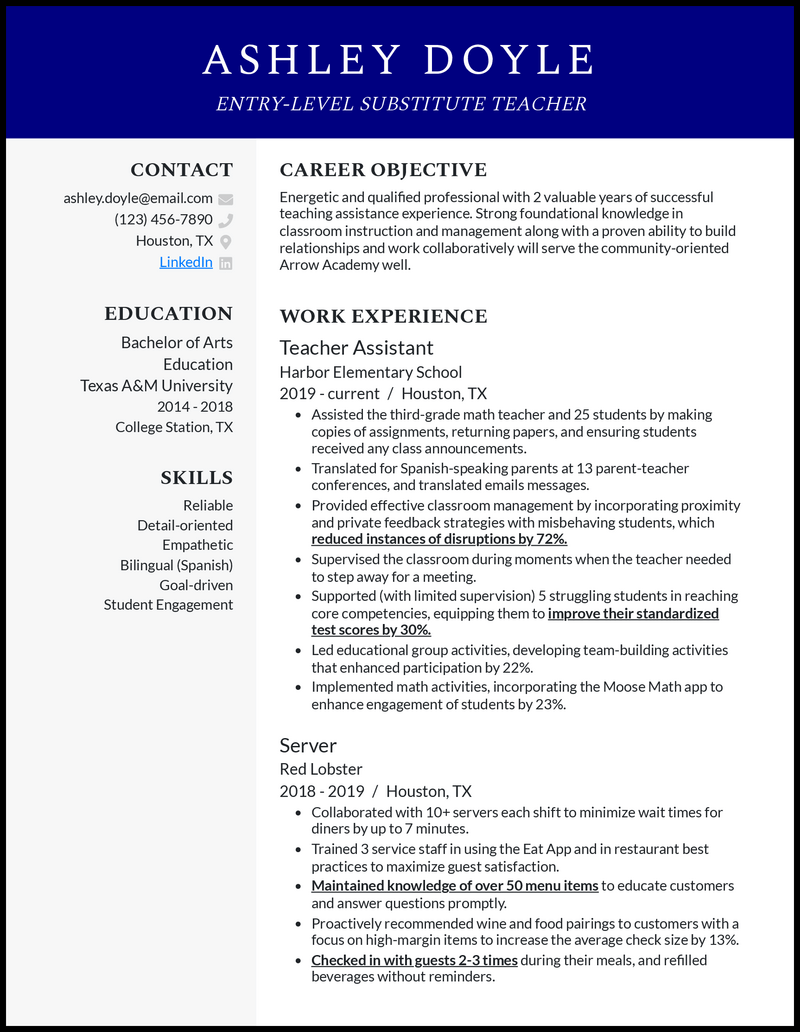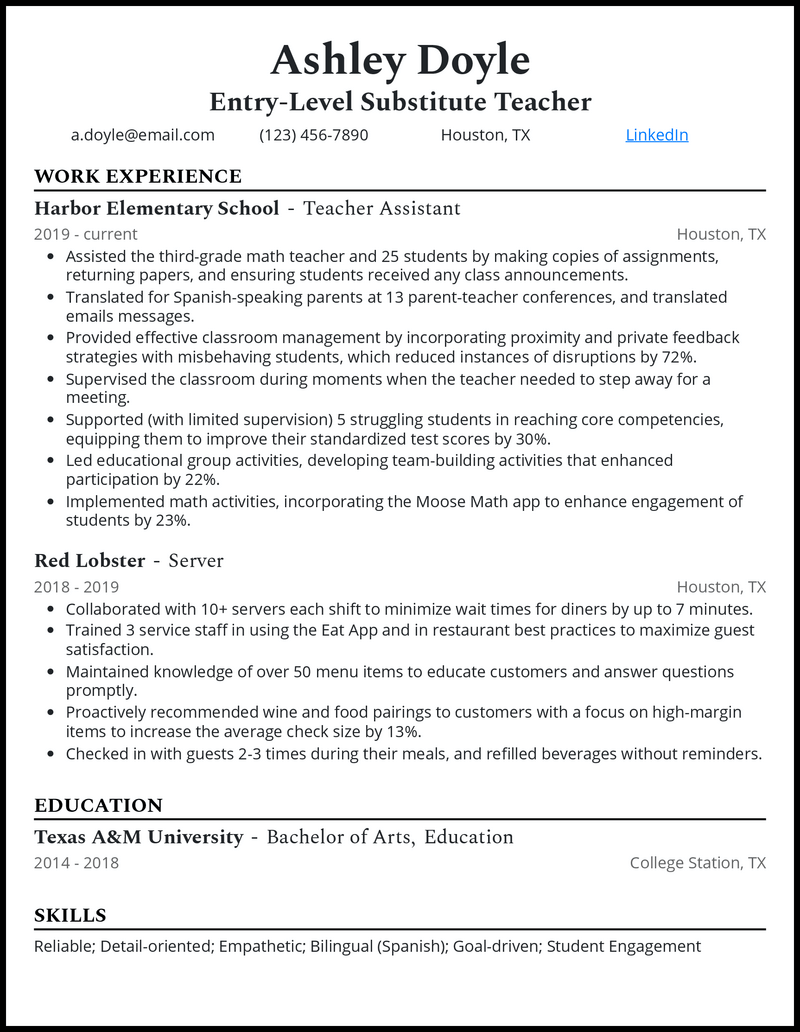A great substitute teacher resume frames your potential the way a hiring principal wants to see it: flexible, dependable, and ready to teach from day one.
Draw inspiration from these strong resume examples and craft an AI cover letter highlighting how you manage behavior, adapt to different learning environments, and confidently write a resume that says, “I’m the sub you can count on.”
This guide will walk you through:
- ↪ 3 entry-level substitute teacher resume templates that work
- ↪ How to overcome your lack of experience and still get hired
- ↪ The best way to present your top transferable skills, showing you’re the substitute teacher they need
Why this resume works
- “Ugh, this is too much.” That’s the likely reaction of a hiring manager slogging through a two-pager that is your entry-level substitute teacher resume crammed with every conceivable reason you’re the top pick. Trust us, keeping it to one page is your best bet.
- Stick to the experience that matters for this role, like when you rocked it as a teaching assistant. In addition, don’t overlook the skills you’ve picked up elsewhere, like your time as a server—being empathetic, detail-savvy, and perhaps even multilingual is gold for this junior role.
How to Write an Entry-Level Substitute Teacher Resume

From adaptability to the patience of dealing with students, you maintain the classroom decorum and ensure learning continues. When applying for the job, your entry-level substitute teacher resume must radiate enthusiasm and a drive to prove you’re not just filling in, but making a difference in each class.
Summary
Leverage your college projects and any teaching certifications to prove your passion for teaching and be on every recruiter’s interview list.
Ready to get your masterclass on building a strong entry-level substitute teaching resume? Here’s a snapshot of what you need:
- Focus on skills that put you in charge of the classroom
- Bring forth achievements from relevant work experience
- Use a clean, modern format that optimizes your qualifications
- Leverage your education and projects to underscore your untapped value

Create a header that sets a positive tone from the start
Arguably, this can be the most important section of your entire resume. The header contains all your contact information and the career objective. When including your personal details, make sure these make it in:
- Full Name
- Phone Number
- Email Address
- Location

Package your strengths in a powerful objective
When the time comes to craft your career or resume objective, you want to make it as specific as possible and we’re not just talking ‘include the school’s name’ level of personalization. We mean tailoring to the very grade or subject focus you expect to teach.
Feel free to take some inspiration from our example below:
Example
“Recent graduate with project experience in assisting teachers and head of departments, seeking an entry-level substitute teacher role. Skilled in following lesson plans, maintaining classroom order, engaging students, and using the latest classroom software, eager to uphold Arrow Academy’s reputation as a school that prioritizes academic excellence.”

Lean on your transferrable skills to showcase readiness for the classroom
One of the first things you’ll probably wonder is, what skills do you list if you don’t have much teaching experience?
Start with any skills you’ve gained from relevant higher education or obtaining your substitute teaching license. Those experiences probably taught you a lot about teaching strategies and classroom management, which will be highly applicable. Also, look at the job description to emphasize skills related to what the school wants candidates to have.
Here are some popular entry-level substitute teaching skills in 2026.
9 popular entry-level substitute teacher skills
- Classroom Supervision
- Differentiated Learning
- Microsoft Office
- Lesson Plans
- Classroom Safety
- Conflict Resolution
- Student Relations
- Student Records
- Lecture Delivery

Make a strong statement with your achievements from relevant work
When schools need to bring in a substitute teacher at a moment’s notice, they’ll want to know they have reliable candidates who can perform effectively.
While you may not have much teaching experience, you can still put many great examples here. For instance, think about other work experiences involving customer service or performing on a tight schedule that’ll translate.
You can also take examples from what you achieved while studying for your substitute teaching certificate or other non-traditional work, such as volunteering.
Here are a few samples:
- Greeted over 65 customers per day, providing friendly service and answering any questions to achieve 98% positive satisfaction scores.
- Diligently studied materials on creating lesson plans and assessing student behavior to achieve a 97% overall grade on the substitute teaching certificate final exam.
- Handled service requests from over 20 customers per day, using quick data management skills to solve 95% of issues in 30 minutes or less.
- Used key presentation skills, such as setting up PowerPoints for visuals and speaking in a clear and engaging cadence during presentations for a communications class, receiving a 96% overall grade.

Bring it back to your university days
Sure, you may be teaching students, but you need to include what you did during your student days as well. As an entry-level candidate, this is a strong selling point, so any degree in education is really going to help your overall profile.
If you’re still pursuing, remember to add your expected graduation date.
Recruiters won’t normally expect you to have certificates, but if you’ve only got a high school diploma, adding them will put more weight to your application. Try getting certificates like Uncommon Sense Teaching Specialization or Get Interactive: Practical Teaching with Technology.

Capitalize on your projects
With no experience, your college projects are the best resource available to prove you’ve got some level of experience managing a classroom or group of people. Projects aren’t limited to college alone.
You can also mention any volunteering stints or internships/externships you participated in. To give you a head start, we’ll list down some basic examples:
- Lesson Plan Portfolio Project: Talk about how you developed lesson plans across subjects, incorporating technology and differentiated instruction methods.
- Classroom Management Simulation: Include any instance of completing a simulation or mock project on handling disruptive behavior with positive reinforcement strategies.
- Inclusive Education Workshop: Add any activity plans you created for ESL students in mainstream classrooms for NGOs or charities.
Top 5 Tips for your entry-level substitute teacher resume
- Use a numerical impact
- All your examples should use a numerical impact to showcase what you achieved. It’ll help you stand out in a results-driven school environment where test scores and assignment completion rates must always be optimized for success.
- Always proofread
- When schools review entry-level resumes, every detail matters to make your abilities to manage student records and lesson plans shine through. Start things off right with an accurate resume that is free of grammatical errors.
- Keep it organized
- Consider how you’d put together a lesson plan for your students. You’d want to have clear headers, bullet points with key statistics you want to cover, and an easily readable font. Your resume should be organized with those same principles in mind.
- Reverse chronological formatting is the best fit
- When you don’t have much experience, you want to optimize what you put at the top of your resume. Therefore, listing your most recent experiences first related to managing lesson plans or classroom supervision is ideal.
- Transferable skills matter
- Several transferable skills like leadership, customer service, data analysis, and teamwork can relate to teaching. When you don’t have much experience leading a classroom, lean on abilities like these as needed to fill out your resume with relevant details.

Key takeaways
- Cover your lack of experience with transferable skills and results from projects
- Showcase passion and potential for everything that happens in and outside the classroom
- Frame your content in an ATS-friendly format that recruiters will love
- Don’t leave any errors that will dull your chances
Entry-Level Substitute Teacher Resume FAQs

A resume objective is a great idea for substitute teachers who don’t have much experience. It’s a great way to showcase a few sentences about your most relevant skills, like four years of customer service experience and maintaining 97% positive satisfaction scores.
A hobbies and interests section can be a great way to display additional skills if you’re struggling to fill up a full one-page resume. For instance, if you were a member of your college’s improv club, it would show applicable abilities to come up with quick solutions as a teacher.
When classroom safety and helping students achieve high grades is a must, schools will want to see a full one-page resume of relevant information to decide you’re the right fit. If you’re struggling, focusing on educational experience, hobbies and interests, or including a resume objective can all help fill up more space.








